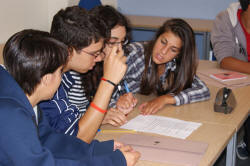Post-modification of noun phrases

There is a
guide to noun modification in general on this site which
you may also like to consult. Here we are concerned only with
post-modification of noun phrases.
There is also a guide to how noun phrases may be pre-modified,
linked in the table of related links at the end.
You may, incidentally, encounter the term qualifier applied to terms which post-modify an item. That is a functional grammarian's term. We shall restrict ourselves to the term post-modifier here but the ideas are similar.
 |
Why post-modify at all? |
There are two ways that post-modification works in English.
- Adding information:
Post-modification of noun phrases is a usually simple device to add information to the noun itself. Although we can say, e.g.:
The man is waving to me. The man is standing in the corner.
it is more elegant and natural to say, e.g.:
The man in the corner is waving to me.
The man who is standing in the corner is waving to me.
The man standing in the corner is waving to me.
There's nothing at all wrong with the first example but the second, third and fourth are simply more natural and precise. - Restricting the noun:
The second effect of post-modification is often (not always) to be restrictive or defining. The terms are often used to refer to the function of relative clauses, to which there is a guide on this site, linked below, but it applies frequently to noun modification of other sorts.
For example, in:
My old computer
we have a simple case of noun pre-modification with an adjective telling us something about the computer. However, in:
My computer in the corner
we have a noun post-modified by the prepositional phrase which defines it rather than describing it.
It is not invariably the case that post-modification acts in this restrictive fashion but that is certainly the way to bet.
Nor is it the case that all pre-modification is non-restrictive because
My old computer
could be intended to distinguish the computer from others in my possession and in that case it will be a restrictive use.
When post-modification is used non-restrictively in the examples which follow, it will be noted.
 |
Why should this be a problem? |
Primarily because languages do things differently and some abjure
post-modification altogether preferring something like:
The
in-the-corner-standing-man is waving to me (other Germanic languages,
for example)
or
The man is standing in the corner and waving to
me (many other languages including Arabic).
Even when a language does use post-modification of noun phrases
(and most do) the structures are often very different. Romance
languages, such as French and Italian, for example, routinely position the adjective after the
noun. This is a phenomenon that can occur in English (as we
shall see) but is quite rare and sometimes gives an unusual sense.
 |
Types of post-modification of noun phrases |
 |
Here are examples of types of post-modification in English.
We'll look at each type in this guide but see if you can already
identify the types of post-modification which these represent. Click here when you think you have an answer. |
- I found nothing useful in the cupboard.
- The man involved has been arrested.
- The people behind me are making too much noise.
- The meeting we attended was a good opportunity to complain.
- The reason why I asked for this meeting is to complain.
- The child playing on the swings has fallen off.
- We need a boat to go over to the island.
- The house built by the river is delightful.
- The house on the river is delightful.
- I found nothing useful in the cupboard.
This is the use of a postpositioned adjective as is conventional after any of the no-, every-, some-, any- set of pronouns.
Other examples are:
something important
nothing interesting
anything extra
everything possible
etc.
When the bare stems of these words are used, they are determiners and the adjective functions normally as in, e.g.:
Have you got any cheaper ones?
There were some interesting people there
He has no useful ideas to add
We want every dead tree removed
This post-modification using an adjective is not restrictive in the way that post-modification usually is. - The man involved has been arrested.
This is another example of a postpositioned adjective but this is not a conventional use in English. Only a few adjectives can do this trick in English. Other examples are:
The people concerned were asked to give a statement
The President elect is going to speak
The money available is inadequate
Adjectives formed with the -able / -ible suffix are also seen as post-modifiers of nouns when the adjective limits the noun in some way. For example:
The money available now (i.e., only some of it) is inadequate
The work accomplishable this week (i.e., only some of it) is enough
The stars visible tonight (only some of them) ...
etc.
When the noun is not limited in this way, the normal ordering is preferred so we can compare:
The available money (i.e., all of it)
The accomplishable work (i.e., all of it)
The visible stars (i.e., all of them)
etc.
There are more examples of this below.
In this case, post-positioning the adjective performs the usual function of post-modification by restricting or defining the noun. So, for example:
The concerned neighbours
is a case of pre-modification which simply describes how the neighbours felt and does not restrict the noun but:
The neighbours concerned
is restrictive because it implies that there were other neighbours who were not concerned. When we use a relative clause in this way, the distinction becomes clearer so we can have a non defining, non-restrictive use as in:
The neighbours, who were concerned, came together
which simply adds information to the neighbours but we can also restrict the noun by having:
The neighbours who were concerned came together
which makes it clear that other neighbours were not involved. - The people behind me are making too much noise.
This is a prepositional phrase with the complement (or object) a pronoun (me). We could also have:
the man opposite her
the women near me
the man in the corner
etc.
Prepositional phrase post-modification is almost invariably restrictive and defines the noun. - The meeting we
attended was a good opportunity to complain.
This is a post-modifying finite clause. It is a relative pronoun clause and, because the pronoun refers to the object, we can omit the relative pronoun (that or which in this case). When the relative pronoun refers to the subject as in, for example:
The people at the meeting who complained were not satisfied
then the relative pronoun must be included so we cannot allow:
*The people at the meeting complained were not satisfied. - The reason why I asked for this meeting is to complain.
Here the adverbial, why, is included (unnecessarily some would suggest) but this example is an adverb relative clause not a relative pronoun clause. In this case, the adverb may be omitted. However, the other three adverbs (place, time and manner) used in such clauses cannot be omitted so we see, e.g.:
This is the hotel where we held the reception
That was when I realised the truth
This was how it should have been done
and the adverbs where, when and how cannot be omitted.
As is almost always the case with adverb relative clauses, in all these cases, their function is restrictive. - The child playing on the swings has fallen off.
This is a post-modifying, non-finite -ing clause. Other examples are:
The man playing the bagpipes
The thing taking up most space
etc.
This can also be seen as a reduced relative pronoun clause akin to:
The child who was playing on the swings has fallen off. - We need a boat to go over to the island.
This is sometimes called the infinitive of purpose although it is actually a reduction of in order to, a complex subordinator.
It is, in this case, non-restrictive because the boat is not being defined, it is being described. - The house built by the river is delightful.
This is a post-modifying, non-finite -ed / -en clause. Other examples are:
Cars made here are cheap but reliable
The window broken by the children has been repaired
etc.
This can also be seen as a reduced relative pronoun clause akin to:
The house which has been built by the river is delightful.
Again, this is a restrictive or defining clause. - The house on the river
is delightful.
This is another prepositional-phrase post-modifier and is restrictive or defining.
 |
Adjectives as post-modifiers |
This refers to examples A and B in the list:
- I found nothing useful in the cupboard.
- The man involved has been arrested.
 |
Pronouns post-modified |
| something heavy |
There are some pronouns in English which, if they are modified at
all by an adjective, are always post-modified.
Sentence A is an example of this. They are primarily the any-, every-, some-,
no- series, combining with -thing, -body, -one or the
pronoun use of else as in these
examples:
- I need something heavier to hold it down
- Have you got anything smaller?
- I have everything necessary for the job
- I have nothing useful to add
- We need someone strong
- What else important have we forgotten?
- Who else interesting was there?
|
|
Why are the following not acceptable, however? Click here when you have an answer. |
- *It can't be done by somebody frightened.
- *Somebody wet came to the door.
- *Nobody satisfied left the meeting.
The
reason is that post-modification of this set of pronouns can only be
done with adjectives which have a sense of a permanent
quality. In these examples, frightened, wet and
satisfied are clearly temporary states. Compare, e.g.
Somebody less self-confident would have failed.
Here,
the sense of self-confident is of a permanent personality
trait.
 |
It is not true to say that this series of pronouns can
never be pre-modified but when
it happens it is usually done for comic effect:
|
 |
Permanent and temporary attributes |
The distinction between permanent and temporary attributes of
adjectives does not only apply to pronoun modification. For
example, it is possibly to have:
The dinner is ready
and
The dinner was delicious
because post-modification signals a temporary
or permanent
condition but it is not possible to have:
*The ready dinner
because that refers to a temporary state although
The delicious dinner
is possible because it refers to the permanent condition of the
food.
There is more on this distinction in the guide to adjectives, linked
below.
 |
Post-modifying adjectives |
| following the noun |
Some adjectives, often borrowed from other languages, occur after the noun (i.e., post-modify routinely) because English has borrowed the word grammar with the word:
- We have strawberries galore (from Irish)
- He's the president elect (from French)
Other examples include court martial, heir apparent, chicken à la Provençale etc. A longer list is in the guide to adjectives.
When we have a string of adjectives, they are quite often in the post-modification position:
- John, over-confident and arrogant as usual, strode into the room
This sort of thing is often considered a reduced, non-defining relative clause
of some sort:
John, who was overconfident and arrogant as usual, strode
into the room.
It is not, in fact, because in our
example, we are simply using the adjectives to describe John
generally, not how he was on that day.
The other issue is, of course, that non-defining relative clauses
cannot be reduced. We allow, e.g.:
I used the tools Mary lent me to finish the
job
or
I used the tools which Mary lent me to finish
the job
or
I used the tools, which Mary lent me, to
finish the job
but we cannot have:
*I used the tools, Mary lent me, to finish
the job.
Adjectival oddities in English
 |
Oddball 1: if we have differences of sex in the noun, we must put
the adjective in the post-modifying position. We allow:
|
 |
Oddball 2: some adjectives change meaning depending on where they
appear.
|
| The adjective involved in example B,
above works in this way, too: The man involved has been arrested. |
 |
Oddball 3: some adjectives describe a permanent state before
the noun and a temporary one after it.
|
|
These adjectives are almost always formed with -ible or
-able suffixes. Many of these adjectives can be used
both before or after the noun with no change in meaning so: The silliest imaginable idea The silliest idea imaginable are functionally synonymous. |
|
 |
Oddball 4: adjectives which are only used predicatively, such as
many of those beginning a- can appear attributively but must be
post-modifiers.
Again, some might justifiably consider these examples of reduced relative
clauses: |
 |
Adverbs as post-modifiersThere is a large group of adverbs which routinely post-modify nouns. |
They refer to place:
- The road ahead was blocked.
- The example below is clear.
- The neighbour upstairs is deaf.
- Your pal here is an idiot.
and time:
- The meeting afterwards was very dull.
- The day before we had been to the beach.
- His trip overnight was uncomfortable.
Some of these items can pre-modify because they occupy two possible word classes (adjectives as well as adverbs) so, for example, we can also have:
- The upstairs neighbour is deaf.
- His overnight trip was uncomfortable.
and in both these cases, the modifier is an adjective (albeit ungradable and defective in other ways). Move the words to follow the noun and they become adverbs.
 |
Clauses as post-modifiers |
| the reason I left to the meeting |
Examples D. and E. in the list are examples of clausal post-modifiers:
- The meeting we attended was a good opportunity to complain
- The reason why I asked for this meeting is to complain.
Relative pronoun clauses and
relative adverb clauses are the dominant
ones of these and they have guides to
themselves so go there for the ways in which such clauses
post-modify nouns phrases (the links are at the end).
Here are a few examples of the
different types:
- The man who stood on the platform. (defining relative clause with the pronoun who)
- The sign which hung over the platform. (defining relative clause with the pronoun which)
- The sign I noticed. (defining relative clause with the omitted pronoun which)
- The sign under which he stood. (defining relative clause with a prepositional phrase)
- The place where the sign hung. (clause introduced with the relative adverb where)
- The reason I came. (clause with the omitted relative adverb why or the omitted prepositional phrase for which)
In all the examples above, the post modifying clause is finite.
 |
Prepositional phrases as post-modifiers |
| the girl in the corner |
Example C, above
The people behind me
are making too much noise
is a post-modifying prepositional phrase and it is restrictive
in stating that there are other people about whom I am not
complaining.
These
come in a variety of flavours and some can be non-restrictive,
although that is unusual. The following is not exhaustive and
non-restrictive uses are signally by '*'.
|
place
source
topic
resembling
|
time
genitive
exception
attribute
|
It is possible with central prepositions (the usual list being
at, from, in, on and to) to convert a
post-modifying prepositional phrase to a pre-modifying classifier so
we can go from:
The table in the corner
to
The corner table.
Only a few prepositions allow this type of conversion and there
is also a restriction in terms of independently mobile nouns so we
do not allow:
The end woman
to replace
The woman at the end
More is covered in the guide to noun pre-modification, linked
at the end.
 |
Constituents of phrases |
We need to be slightly careful in deciding what exactly a prepositional phrase is modifying or our hearers can misinterpret what we mean.
For example, the sentence:
Jane spoke to the man behind the bar
can be understood in two ways, like this:

In the first sentence, the verb is being
post-modified and tells us where she spoke so the
modified verb
phrase is:
spoke ... behind the bar
In the second sentence, the noun is being
post-modified and the object noun phrase is:
the man behind the bar
When the first sense is intended, speakers will insert a slight
pause between the man and behind the bar, making
two tone units each with a stressed syllable: the
man and behind the bar.
When the second sense is intended, the man behind the
bar will constitute a single tone unit
with one stressed syllable.
Linked in the list of related guides at the end are:
- the guide to sentence stress which explains how tone units function to disambiguate what a phrase is modifying.
- the guide to constituents of phrases where you can learn more.
- the guide to prepositional phrases concerned more with how they post-modify clauses.
 |
Non-finite clauses as post-modifiersIf you aren't certain what a non-finite clause is, check out the guide linked in the list of related guides at the end or click here to go there now (new tab). |
We saw, above, that post-modifying adverb and pronoun relative
clauses are finite insofar as the verb takes inflexion for number
and tense. Many more clauses used to post-modify noun phrases
are non-finite.
There are three flavours.
- -ing participle clauses
-
usually refer to an ongoing state or a progressive action
(are, i.e., continuous, iterative or progressive in terms of aspect).
They can be considered reduced relative pronoun clauses with the
form of the verb be and the pronoun omitted.
For example:- The house being built on the corner will look lovely.
- The boy working on his homework looks a bit tired.
- The man spending all the money has won the lottery.
- The train taking us to the airport will be crowded.
- The students sitting the examination tomorrow are nervous.
- past participle -ed / -en clauses
-
usually relate a past action or state to a present or
subsequent state or action (i.e., are perfect in terms of aspect).
These, too, are sometimes analysed as passive clauses or as reduced
relative clauses (and the latter type of analysis is the one you
will find on this site in the guide to relative pronoun clauses).
The most common connecting preposition is by but with and (out) of are possible:- The letter written by his mother contained good news.
- The car repaired by that bloody garage has broken down again.
- Anything not claimed soon will be given away to charity.
- It was a house built of brick and concrete
- He wore a suit lined with blue silk
- It was a wall constructed out of stones from the garden
an office block built out of concrete and glass
a road paved with stone
*a road paved out of stone
a roof reinforced with steel
*a roof reinforced out of steel
A further restriction is that out of and with imply a constituent material and of implies that the material is the sole constituent:
a cake made with cream, flour and eggs
a cake made out of cream, flour and eggs
vs.
a cake made of cream - to-infinitive clauses
-
usually refer to a future or following action or state
(i.e., are prospective in terms of aspect).
- The next bus to arrive will be the 14:30 to Manchester.
- A good restaurant to visit is the Golden Horn.
- The instructions to follow are written on the box.
The instructions which you are to follow are ... .
Non-finite clauses are economical and elegant.
All the following can be rephrased more elegantly by the use of non-finite clauses:
- The book which he wrote while he
was in prison has become a best seller
is better as
The book written while he was in prison has become a best seller - The vase that the child broke was
very valuable.
is better as
The vase broken by the child was very valuable. - The 8 o'clock bus is always busy
and noisy with the children who are going to school
is better as
The 8 o'clock bus is always busy and noisy with children going to school - The thing which we all need to
understand is that we don't have the resources
is better as
The thing to understand is that we don't have the resources. - A place which you should visit is
the Guggenheim Museum
is better as
A place to visit is the Guggenheim Museum
 |
Non-parallelism |
There are times when it is not possible at all to form the parallel finite relative clause, at least, not without making changes.
- Relational verbal processes.
Relational verbs, as the name implies are verbs which describe the relations between items and they can take the -ing form when acting as post-modifiers in non-finite clauses. They are often, slightly misleadingly, referred to as stative. It is the use of the verb which is stative, not the verb itself.
We can have, for example:- A tie neatly matching his shirt – The tie matched (not was matching) his shirt
- A number closely approximating to 10 – The number approximates (not is approximating) to 10
- A proposal clearly smacking of authoritarianism – The proposal smacks (not is smacking) of authoritarianism
- A scent recalling the Mediterranean – A scent (which/that) recalls (not is recalling) the Mediterranean
- A soup consisting mostly of beans – The soup (which / that) consists (not is consisting) mostly of beans
- We can also use verbs which express in the state of
so we get non-finite modifiers such as in:
- Dave, being old,
knows the right answer
but not - *Dave, who is being old, knows the right answer
- Dave, being old,
knows the right answer
- The other issue is one of tense. If there
is a tense shift, the relative clause conversion will not work,
whatever type of verbal process is used. For example:
- A tree falling on my car did the damage
from which we can’t make a relative clause easily because you don’t mean:
A tree which is falling on my car
but you do mean
A tree which fell on my car - You will see a woman waiting for you
is not the same as
You will see a woman who is waiting for you
because you mean
You will see a woman who will be waiting for you
- A tree falling on my car did the damage
To summarise:
Verbs may take the -ing form in post-modifying non-finite
clauses without having a corresponding form in the relative clause.
That is especially but not exclusively true of relational verbs.
 |
Teaching and learning noun post-modification |
All the preceding should have alerted you to the fact that
post-modification is not to be taken lightly. It is, however,
important for all learners to be able to handle the devices
confidently. This is especially true in writing (and for those
learners for whom academic or formal writing skills are important,
knowledge of how to post-modify noun phrases is essential).
Here are some suggestions.
 |
Focus on one at a time |
There's little point in overwhelming learners with a mishmash of different types of post-modification and it makes sense, therefore, to focus on one sort at a time. Here's a suggestion of the order in which to tackle the area:
- The easiest are prepositional phrases because the area is
already well known to many learners.
Transforming, for example:
The cupboard is under the stairs
to
The cupboard under the stairs
does not require high-level analysis.
It is significant, however, that the simple post-modification with an adverb is often avoided by learners even at higher levels so the unnatural:
The results are above and indicate ...
instead of the preferable:
The results above indicate ... - Adverb post-modifiers concern only a few common enough
adverbs and are also quite easy to tackle.
The small complication in this area is that fact that only some words can be adverbial and adjectival so, while we can have:
The toilet downstairs
and
The downstairs toilet
we cannot have
*The ahead road
instead of
The road ahead
because ahead is only adverbial. - The any-, some-, no-, every- set of pronouns can be
taken as a discrete area because the rule is clear: all of them
are conventionally post-modified (and else may be
included at higher levels).
Here, the complication to make clear is that the adjective which post-modifies the pronoun must describe a permanent quality so, for example,
Somebody strange came to the door
is acceptable, but
*Somebody tired came to the door
is not.
See below for more. - Clausal post-modification needs handling with relative
clauses and requires a staged approach. Again, mixing up
the types will just confuse and bewilder your learners.
Here, the complication is that first languages such as Korean, which do not have a relative clause structure, make it difficult for their speakers to learn how relative clauses are constructed in English. Once learned, however, they may be overused so learners may prefer:
The restaurant which was destroyed in the fire
to
The restaurant destroyed in the fire
because that is how they have been told English post-modifies nouns. It is important to be clear that relative clauses are not the only way to post-modify a noun phrase.
Non-finite clauses, in particular, can be a mysterious area for many learners and need handling in small chunks.
The aspectual nature of non-finite post-modification is not parallelled in many languages so the presentation needs to make it clear that:- -ing participles refer to continuous, iterative
or progressive states or events so we have, e.g.:
The old man with the dog playing the piano on Saturday nights is really talented (iterative)
The girl singing now is terrible (progressive)
The man living on the corner is very helpful to his neighbours (continuous)
and can refer to the future as in, e.g.:
The film coming to the cinema soon is one to miss (prospective) - past participle forms relate two events or states in
time, e.g.:
The furniture broken in the fight was replaced (pre-past embedded in the past)
The man hurt in the fight is in hospital (past embedded in the present)
The work done today will be appreciated (present embedded in the future) - to-infinitive forms are usually prospective,
even when they are set in the past or the future, so we
have, e.g.:
The place to go first is the pub on the corner (prospective from the present)
The place to visit was the theatre at Epidaurus (prospective in the past)
The book to read will be his next novel (prospective in the future)
- -ing participles refer to continuous, iterative
or progressive states or events so we have, e.g.:
- Other adjectival post-modification is comparatively rare and
there are a number of exceptional cases (see the references to
oddballs above). This area may be best handled on a
case-by-case basis, dealing with them as they occur in texts or
have been noticed.
The exception to this is the regularity of -ible and -able adjectives used this way as in, e.g.:
The only problem discernible was the time factor
The men expendable were sent out first
All the land obtainable had been bought
This will not work with all these adjective forms and trying it with some will produce questionable or malformed expression such as:
?The work achievable was finished.
?The policy discernible was mistaken
*A suggestion arguable was made.
any-, some-, no-, every-
Presenting the area isn't hard; that can be done via a dialogue or a noticing exercise such as:
| Look at these conversations. What do you notice about the words in red? | |
| I need
something heavy
to hold this down. I'll find a big rock. |
We need
something exciting
to start the show. What about this? It's a great song. |
| I like the
shoes but do you have anything
cheaper? The colour is different but this is a cheaper pair. |
Have we
packed everything important?
We haven't forgotten anything
essential, have we? No, I don't think so. We used the long list of important things. The first-day stuff is at the top. |
| Did you do
anything exciting on your
last holiday? Nothing very thrilling but we went for lots of long swims and did some good climbing in the mountains. |
Is anybody
interesting at the party? Not really. I have met some really boring people but there was someone fascinating that you should meet. It's the tall woman in the corner. |
Three things should come out of this:
- The target adjective position after something, anything, everything etc.
- That other adjectives usually precede the noun.
- That most adjectives can be used predicatively and attributively.
Controlled practice can involve sentence re-ordering tasks, gap fill, sentence completion tasks and so on.
Slightly less controlled practice can have learners making true sentences about their environment from adjectives you (or they) supply. For example:
new + class: there's somebody new in the class
edible + refrigerator: there's nothing
edible in the fridge
attractive + wall: there's something attractive on the wall
This can be extended to guessing games:
I'm thinking of something beautiful in the garden
There's nothing
useful in what I'm thinking about
etc.
To raise awareness of the limitation to permanent states, learners can be invited to notice why, for example, of the following pairs of sentences, only one is acceptable:
- Nothing useful came out of the meeting
Nobody happy was there - Something elastic is needed
Something closed is needed - Everybody European needs a visa
Everybody puzzled wanted an answer
 |
Prepositional phrase building |
Starting with a simple sentence, learners can build post-modification with prompts from you:
There was a vase. | where?
There was a vase in the corner |
which corner?
There was a vase in the corner of the dining room |
where exactly?
There was a vase in the corner of the dining room by the door I
when did you see it?
There was a vase in the corner of the dining room by the door
yesterday evening
and so on with a different starter sentence.
The same can be done with adverb post-modifiers, of course, and there's a much more limited set to choose from.
 |
Complex post-modification |
At higher levels, noticing first, some text analysis and then a task to draft, write, improve and polish a text of your own can be effective and constructive. It needn't be a long text because post-modification is useful for compressing data.
| Underline the ways the nouns are modified by the words following them. |
| Brighton is now an official
city proper with
everything essential for a
holiday for all the family. The
Pavilion built by a
king of England in the central
square of the town is renowned worldwide for its
art deco style. The Lanes running behind the seafront have antique shops aplenty with nothing missing for the connoisseur of everything old and beautiful. The countryside nearby is also spectacular. Enjoy a day of sightseeing, shopping and food of great quality. |
| Now write a similar text about a town in your country that you know well. Try to modify the nouns in the same kinds of way. |
There is a short test on some of this.
| Related guides | |
| modification: essentials | the general, elementary introduction to the area of modification |
| noun modification | an overview of noun modification |
| noun pre-modification | a sister guide to the other sort of noun modification |
| finite and non-finite forms | for more on finite and non-finite verbs and clauses |
| relative pronoun clauses | for more on two special types of noun-phrase modification |
| relative adverb clauses | |
| constituents of phrases | for more on how we work out what belongs where |
| sentence stress | for more about tone units |
| adjectives | the dedicated guide to this word class |
| prepositional phrases | for more on how these post-modify clauses and phrases of all kinds |
References:
Butt, D, Fahey, R, Feez, S, Spinks, S and Yallop, C, 2001, Using Functional Grammar: an
explorer's guide, Sydney NSW: NCELTR
Chalker, S, 1984, Current English Grammar, London: Macmillan
Lock, G, 1996, Functional English Grammar, Cambridge:
Cambridge University Press
Quirk, R, Greenbaum, S, Leech, G & Svartvik, J, 1972, A Grammar of
Contemporary English,
Harlow: Longman
